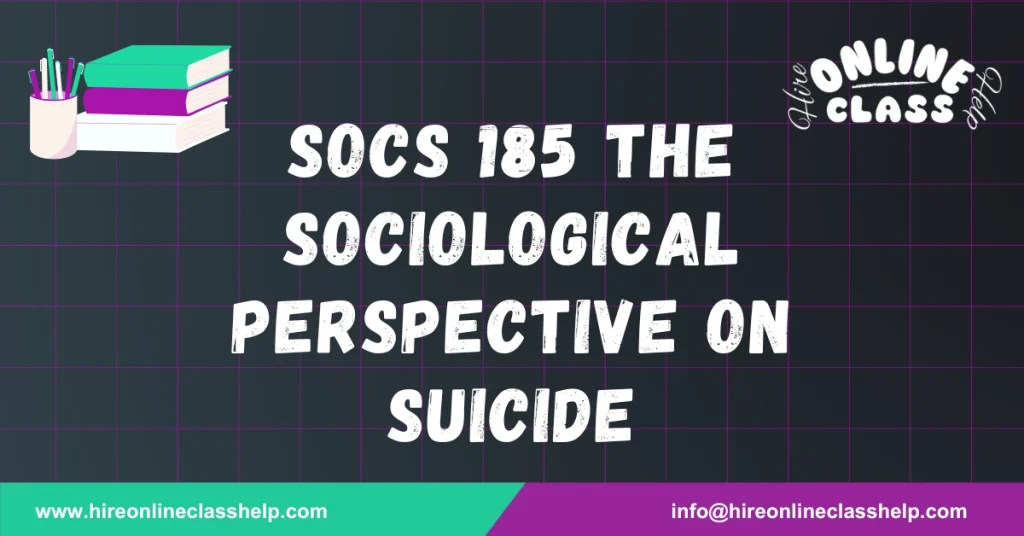






Name
Chamberlain University
SOCS-185 Culture & Society
Prof. Name
Date
This article delves into the sociological perspective on suicide, emphasizing the importance of recognizing the relationship between personal troubles and public issues. By applying the sociological imagination, one can understand how individual decisions, such as suicide, are influenced by broader societal factors. This examination highlights the judgmental tendencies of society and the harmful impact of discrimination on both individuals and the community at large. Additionally, the article explores how sociological theories can be used to address recurring social problems like suicide, offering insights into solutions rooted in a deeper understanding of societal dynamics.
According to Kendall (2018), sociological imagination refers to the ability to see the connections between individual troubles and larger social issues. While suicide is commonly viewed as a deeply personal act, it is essential to consider the societal factors that may influence an individual’s decision. In today’s society, the prevalence of judgment creates an environment where individuals may feel isolated or overwhelmed, increasing their vulnerability. The societal context, including the stigma and exclusion faced by marginalized individuals, can contribute significantly to the development of suicidal thoughts.
In terms of discrimination, societal biases based on class, religion, race, or sexual orientation have profound effects on both individuals and the broader community. When people do not conform to perceived societal norms, they may experience exclusion, stigmatization, and hopelessness. These negative experiences not only harm mental health but also elevate the risk of suicidal ideation. Thus, understanding suicide requires examining it not only as a personal issue but also as a reflection of the larger discriminatory and judgmental social environment.
To address social problems such as suicide, it is necessary to apply appropriate sociological theories for a comprehensive understanding and intervention. While psychological theories might be useful for understanding individual behavior, recurring issues like suicide require a focus on social theories. Sociological theories allow for a broader examination of societal structures, norms, and inequalities that contribute to the prevalence of suicide. By identifying these systemic factors, interventions can target the root causes, leading to the development of a more supportive social environment.
The sociological perspective underscores the importance of societal change over focusing solely on individual responsibility. This approach advocates for addressing broader social issues that contribute to suicide, such as discriminatory attitudes and lack of social support. By fostering an environment of acceptance, understanding, and compassion, society can create the conditions where individuals feel less inclined to consider suicide as a means of escape.
The sociological perspective on suicide emphasizes that real solutions lie in societal transformation, rather than placing the burden entirely on individuals. Recognizing that suicide stems from broader social issues encourages efforts to foster a compassionate, inclusive, and supportive society. This transformation involves challenging discriminatory attitudes, promoting acceptance, and building strong support systems for those at risk. By cultivating an environment where individuals feel valued and understood, society can help reduce feelings of isolation and hopelessness that often lead to suicidal thoughts.
Through collective action, it becomes possible to create an environment where individuals feel empowered and less likely to resort to suicide as a means of coping. Societal change is essential for reducing the prevalence of suicide and ensuring the well-being of individuals and the larger community.
Understanding the sociological perspective on suicide is essential to grasp the intricate relationship between personal troubles and public issues. Acknowledging the influence of societal factors, such as judgment and discrimination, allows us to move away from blaming individuals and toward promoting positive societal change. By applying sociological theories and working collectively, we can address the root causes of suicide and create a more inclusive and supportive society. By fostering empathy, acceptance, and societal transformation, it is possible to reduce the incidence of suicide and promote the well-being of both individuals and communities.
Kendall, D. (2018). Sociology in our times: The essentials. Cengage Learning.
Brinks, M. (2019, July 22). What is sociological imagination? How can you use it? PrepScholar.
https://blog.prepscholar.com/what-is-sociological-imagination-examples
| Section | Key Concept | Description |
|---|---|---|
| Introduction | Sociological perspective on suicide | Examines how societal factors influence personal decisions like suicide and emphasizes the role of societal judgment and discrimination. |
| The Sociological Imagination and Personal Troubles | Sociological imagination, judgment, discrimination | Discusses how societal factors, such as exclusion and stigmatization, impact individuals and contribute to suicidal ideation. |
| Applying Sociological Theories | The role of sociological theories in addressing suicide | Highlights the importance of applying social theories to understand systemic causes of suicide and suggests societal interventions to address the problem. |
| The Importance of Societal Change | Societal transformation to reduce suicide rates | Stresses the need for societal change, acceptance, and support networks to mitigate the risk of suicide and foster a more inclusive and supportive society. |